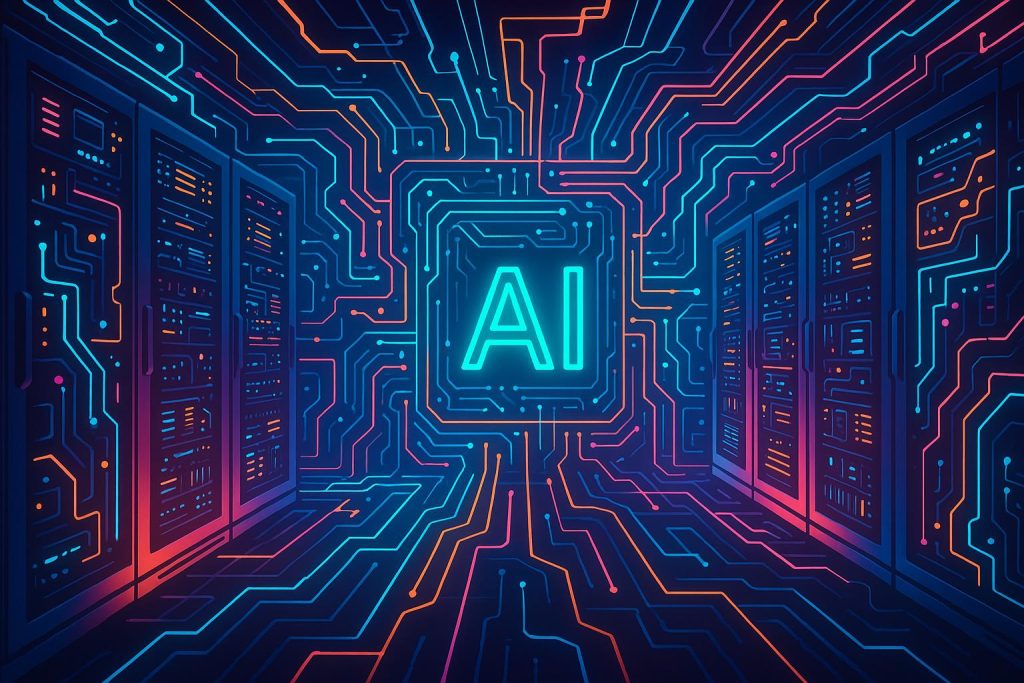Listen to the article
A landmark $14.2 billion agreement between CoreWeave and Meta highlights the accelerating race for AI hardware dominance, amid rising strategic investments across the industry’s key players.
The AI infrastructure landscape is increasingly defining the competitive edge in the technology sector, as recent weeks have seen a surge in multi-billion-dollar deals and strategic investments. This trend reflects an intensifying race among cloud compute providers, chip manufacturers, and hyperscalers to secure long-term supply of cutting-edge hardware and computing capacity, which underpins the burgeoning AI market.
A landmark development in this arena is CoreWeave’s $14.2 billion agreement with Meta, set to extend through to the end of 2031, with a possible extension into 2032. This deal significantly boosts Meta’s AI computing capability, particularly through access to Nvidia’s latest GB300 systems, complementing Meta’s ongoing prioritisation of AI and data centre investments across the United States. CoreWeave’s market valuation has soared to approximately $60 billion following the announcement, driven by heightened demand for AI infrastructure. This agreement builds upon CoreWeave’s deepening relationship with OpenAI, which recently expanded to include a $6.5 billion contract, adding to previous agreements valued at $11.9 billion and $4 billion earlier this year. Together, CoreWeave and OpenAI’s collaboration now totals $22.4 billion, underscoring CoreWeave’s pivotal role in powering large-scale AI workloads.
OpenAI’s extensive partnerships form part of its ambitious $500 billion ‘Stargate’ infrastructure programme, an initiative led alongside key stakeholders including SoftBank and Oracle. Stargate aims to develop 10 gigawatts of total computational capacity through newly launched data centres, including sites facilitated by Oracle and SoftBank, bringing capacity close to 7 gigawatts thus far. This initiative demonstrates a comprehensive effort to secure vast AI-related computing power, with Nvidia supplying chips for the project and pledging up to $100 billion in investment and hardware provision. South Korean chip manufacturers Samsung and SK Hynix are also collaborating on the development of two key data centres, ensuring a diversified and robust hardware supply chain. Arm Holdings contributes chip architecture innovations, positioning itself as a major alternative to x86 chip competitors in this space.
Meanwhile, hyperscalers and other AI infrastructure players continue to attract significant investment. Nscale, for instance, secured $1.1 billion in Series B funding to enhance AI infrastructure across Europe, North America, and the Middle East, while Cerebras Systems successfully raised $1.1 billion after a prior IPO filing setback. Signal AI also drew in $165 million to bolster its risk and reputation platform, and edge AI startups such as InOrbit.AI and Ultralytics secured substantial funding rounds to scale robotics orchestration and edge computing capabilities respectively.
Venture capital activity mirrors this momentum, with new and expanded funds targeting AI-focused startups. Evantic Capital launched a $400 million AI investment fund, while Touring Capital and Chiratae Ventures raised $330 million and $150 million respectively for early-stage AI innovations. Major technology companies are also active in this space, with Google announcing a $9 million fund to stimulate AI growth across Africa and offering free AI tools for students. India’s Together Fund and Deloitte’s AI Centre of Excellence highlight regional commitments to supporting AI startup ecosystems and expanding infrastructure.
Product-level innovations further illustrate the increasing sophistication of AI applications, with companies like Peloton experiencing stock gains following AI-driven product overhauls. Similarly, Alvys attracted $40 million to revolutionize transportation management through AI automation, and SwissBorg secured funding to scale distributed AI and data infrastructure networks.
Collectively, these developments highlight a clear investment thesis: capital is gravitating towards projects that either secure infrastructure superiority or demonstrate focused execution on AI applications. Long-term strategic supply deals and infrastructure partnerships form the backbone of growth in this sector, reinforcing the critical role of hardware and computational capacity as foundational to AI’s future.
📌 Reference Map:
Source: Noah Wire Services



